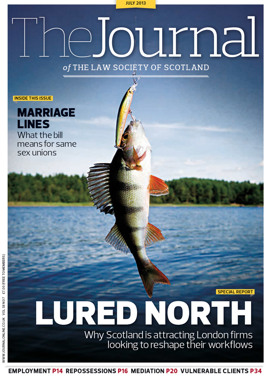Sins of our leaders

Solicitors must be a very virtuous lot. Either that or they are as unwilling to admit to their own failings as they are to those of their clients. Whatever the reason, it was a select company of managing partners or equivalents who felt sufficiently in need of redemption to sign up for Update’s juicily titled “Seven Deadly Sins of the CEO” seminar last month. But read on, and repent.
Breakfast was provided; would the first deadly sin turn out to be gluttony? No. Anyone looking for a tabloid-style exposé of vices committed behind closed boardroom doors would have come away disappointed. Instead, a punchy presentation by Paul Pinson of “chief executive organisation” Vistage (www.vistage.co.uk) challenged his audience on the extent to which they keep their eye on the more strategic aspects of their business, and relate to their people in doing so.
In fact, Pinson explained, his “deadly sins” are really barriers. Most of them look like sins of omission rather than commission. Lurking behind them are common fears: of failure, of getting it wrong, of rejection, of being out of the comfort zone. Set out in the box below, some of them are fairly self-explanatory. The first, however, “Managing, not leading”, is an interesting one and took up a fair bit of discussion on the day.
Where is the leadership?
Not that there’s anything wrong with managing, of course. Someone has to do it. And in practices typical of those represented (perhaps most others too), it’s likely to fall on the same person as is expected to lead – who also has to bring in their share of fee income along the way. But even if the mantra “Lead – let others manage” may err on the side of piety, the important thing, Pinson emphasised, is to be clear about the difference between the two, and ensure that you set aside enough time each week or month to focus on leadership.
Where is the line drawn? Managers administer; they keep things going; they organise. Their view is short term and bottom line. Leaders innovate; they develop things; they focus on people and win their trust. They have their eyes on the horizon. They work on rather than in the business.
Delegation, the subject of sin number two, also provoked a bit of discussion. Pinson’s prescription is to delegate results, not tasks. “But how the result is achieved is important,” someone objected. His rejoinder was that setting parameters is also defining the result. And we came back at number five to achieving the necessary levels of competence. Meantime he suggested that managers ask their reports, perhaps every six months: “What are the three things I’m currently doing that I should be delegating to you?”
Number three is a biggy. How many firms say “Our people are our biggest resource”? That isn’t enough for Pinson, who insists that it has to be the right people. So failing to have effective policies to identify, recruit, motivate and retain excellent people – all four being important – is another on the “Bless me, Father” list for confession. Each of these was given a closer look, on which, sadly, space does not permit a fuller report.
The quote introducing the fourth listed sin ought to strike a chord with most: “We’ve got very little money; we’re going to have to think” (Sir Ernest Rutherford, physicist). Innovation equals survival, Pinson added, challenging his audience to look beyond their existing customer base – “They will only help you incrementally innovate” – to their inevitably larger number of non-customers. If they are not customers, why not?
Making magic
Sin number five, tolerating poor performance, is “all-pervading”. And for Pinson, a seven out of 10 mark isn’t really good enough. Can you get people at that level to nine or 10? If not, he challenged us, are you tolerating poor performance, by setting a low level of expectation? Because to achieve the kind of delegation you need to avoid sin number two, you must have people who are nines and 10s. Again it’s a question of having systems in place, in this case to support conversations about poor performance.
Number six, “choosing abdication over navigation”, is about steering the ship once you have set the course. Key elements are making sure your vision is clearly communicated and understood, so people buy in to the business plan, which in turn is reflected in their goals and job descriptions; and that there is regular monitoring and sharing of progress, with course adjustments as circumstances require.
“The most dangerous place for a business leader is behind their desk!” Pinson proclaimed, introducing sin number seven– one clue for those wearing several hats as to how to differentiate the leader from the manager role. It’s about being seen to take an interest in people and what they are doing, and building the employee engagement that is crucial in taking the business forward.
Solicitors are often heard to say: “We didn’t enter the law to be managers”, and may well feel that they are already out of their comfort zone. But your comfort zone isn’t where the magic happens, as Pinson put it. And don’t assume you are more aware of risk than the average entrepreneur – they, however, think through how to manage the risks.
It just takes getting people to buy in.
Seven ways to lose your soul
- Managing not leading
- Poor delegation
- Lack of effective people policies
- No leadership of innovation
- Tolerating poor people performance
- Choosing abdicationover navigation
- Lack of visibility.
In this issue
- Credit hire: back to basics
- You know who I mean
- Behind all the fun
- Your Future in Law
- Reading for pleasure
- Opinion column: Cameron Fyfe
- Book reviews
- Profile
- President's column
- Mapping out the Crofting Register
- Back office bait
- Another bite at the cherry
- Security of your home
- Marriage redefined
- Building better business cultures
- Keeping a rein on child cases
- Minimum gain
- Beware LLP tax changes
- Framework remodelled
- Scottish Solicitors' Discipline Tribunal
- A Scottish ILG chair in New York
- Beneath the surface
- Being alert to the needs of the vulnerable
- Sins of our leaders
- How not to win business: a guide for professionals
- Litigation: a tight ship?
- Ask Ash
- Why sep rep?
- From the Brussels office
- Law reform roundup
- Diary of an innocent in-houser






